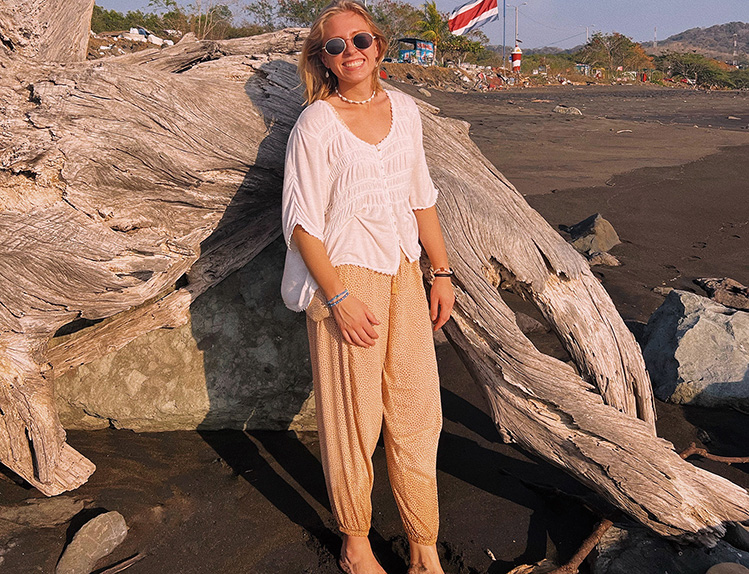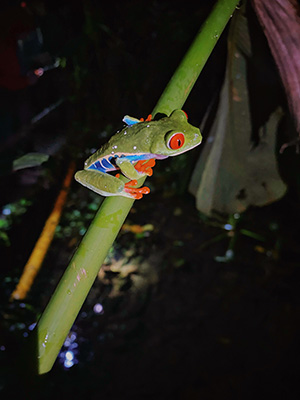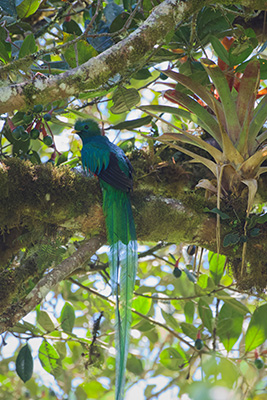
Allison Ludlow ’24 explored ecology, sustainability, and community during her study abroad trip to Costa Rica.
Allison Ludlow ’24 chose Costa Rica as her spring break destination, not to hang out on the beach with friends but to explore the biodiversity, ecology, and sustainability practices of the country through a study abroad trip led by Diane Husic, director of environmental studies and professor of biology at Moravian. Ludlow also learned a lot about herself. Here, she shares her reflections on that experience.
The opportunity to travel to Costa Rica through study abroad was one of the most formative experiences of my life. I am grateful to have had the chance to travel independently and study nature and conservation, which is what I am most passionate about. I’ve learned so much about myself on this journey and can see the world around me with a fresh perspective.
The experience catalyzed my personal and academic development by providing the opportunity to learn lessons I had never had in the classroom. It pushed me outside of my comfort zone, where the bulk of personal growth happens. During my two-week excursion, I tried new things, developed connections with others, and strengthened my personal ties to nature while revitalizing my innate curiosity and love for the sciences.

Costa Rica offers many notable differences from the United States, which were both an adjustment and a refreshing change. Costa Rican culture appears much less regimented than that in the United States. Common dress is modest, and people seem to care less about personal appearances than they do their friends and family and maintaining connections with others. Most people I encountered were very friendly–not merely to appease tourists–but because these values are ingrained in Costa Rican culture. Strangers on the street smile and wave as you pass by, and hugs from new acquaintances are not uncommon. During my time conversing with some of the locals and learning more about their lives, I found that the language barrier didn’t hinder the opportunity for connection, it actually strengthened it.
As I look back, some of my most cherished experiences were at mealtime. Though scheduled eating was part of the trip itinerary, the atmosphere of each meal was memorable. The relationship between food and culture was evident every time we gathered to eat. Our food was cooked with care from scratch, using fresh, local ingredients. I tried so many new foods, and I developed a true appreciation for the local cuisine. Mealtime in Costa Rica was notable, not only for the food, but more importantly, for the emphasis the community places on connecting with one another over a meal.

Above all else, this trip sanctified my relationship with nature. I’ve read a lot about the spiritual bond others like Thoreau and Muir have felt when spending time in nature, particularly documented at the more awe-inspiring places they visited. This is a feeling I’ve had the privilege to understand throughout my travels and time outdoors, and it’s a feeling I continue to pursue as it helps me derive meaning from my life.
I enjoyed a wealth of wonderful experiences during my two-week excursion. I encountered so many species, including the red-eyed tree frog, three-toed sloth, and resplendent quetzal, which I thought I’d only ever see in National Geographic. I would wake up at 5 a.m. to the screeching of Howler monkeys. I swam in a plunge pool fed by a remarkable waterfall and stayed at the foot of the country’s most famous active volcano. Arguably the most spectacular moment for me was when our group caught footage of a jaguar family on the camera traps we set up on the trails. It is extremely rare to see jaguars in the wild. Encountering so many species filled me with gratitude because most of us never have the opportunity to come so close to such beautiful and wild creatures.

It was heartening to experience a culture where nature is allowed to flourish past the infrastructural boundaries that we work so tirelessly to combat in westernized society. The dense and verdant expanse of nature across the landscape was an incredible sight. I found that it was sometimes difficult to distinguish property boundaries from forest territory because they are so heavily integrated with the landscape in most places.
What most affected me was when I ventured into the rainforest and felt grounded in the notion of nature’s beauty and resiliency. To feel how small and fragile our species is compared to all life on Earth was palpable. Tico [native people of Costa Rica] recognize that we are not apart from nature, we are nature, and we can add such richness to our lives when we stop trying to exert total control over these wild and biodiverse places.
My journey to Costa Rica reinforced the idea that travel truly is the only thing you buy that makes you richer. As I reflect on this trip, I realize that I’ve learned so much about the world and myself. It was valuable to my personal growth and overall perception of the world.
“I took a walk in the woods and came out taller than the trees.”— Henry David Thoreau